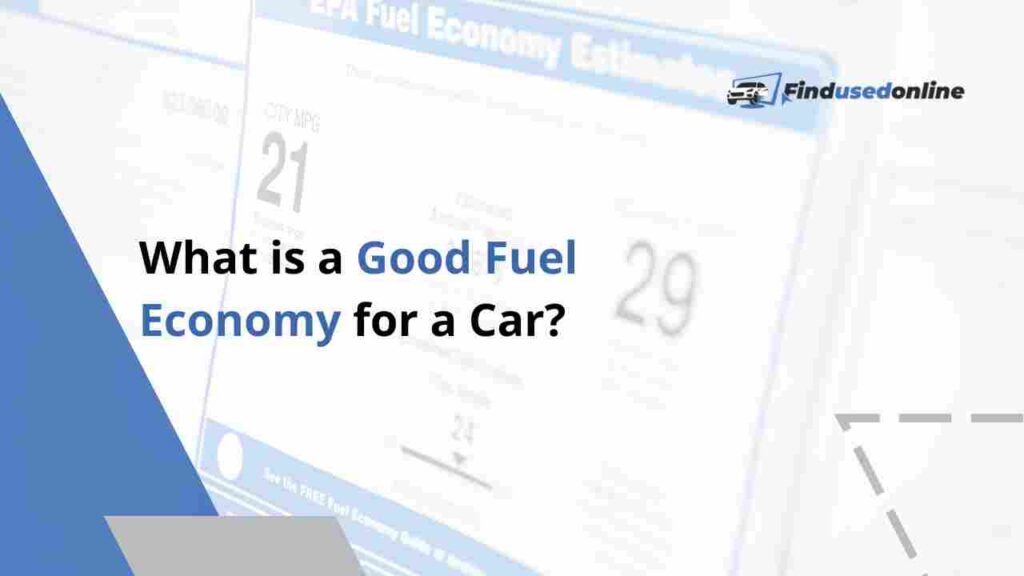Fuel economy, commonly referred to as miles per gallon (MPG), plays a pivotal role in the decision-making process for car buyers. It measures how far a vehicle can travel on a single gallon of fuel, directly influencing ownership costs and environmental impact.
However, what constitutes “good” fuel economy varies depending on vehicle type, driving habits, and advancements in automotive technology. In this guide, we’ll break down everything you need to know about fuel economy, its benchmarks, benefits, influencing factors, and tips for improvement.
RELATED: Why a Mileage Check is Crucial When Buying a Used Car
Understanding Fuel Economy
Fuel economy is typically expressed as miles per gallon (MPG) in the United States or liters per 100 kilometers (L/100 km) in Europe. It represents the distance a vehicle can travel using one gallon of fuel or the amount of fuel consumed over a specific distance.
City vs. Highway MPG
- City driving often involves frequent stops, idling, and lower speeds, which consume more fuel and result in lower MPG.
- Highway driving usually provides better MPG due to consistent speeds and fewer stops.
Why Fuel Economy Matters
- Budget Impact: A vehicle with higher fuel efficiency reduces the frequency of fuel fill-ups, saving you money over time.
- Environmental Concerns: Fuel-efficient cars emit fewer greenhouse gases, helping to minimize your carbon footprint.
Understanding these fundamentals can help you make informed decisions when evaluating a car’s suitability for your lifestyle and budget.
RELATED: How to Find the Service History of a Car
What is considered a good Fuel Economy?
What qualifies as “good” fuel economy depends on the vehicle category. Let’s explore the benchmarks for various vehicle types:
Compact Cars
- Typical MPG Range: 25-35 MPG
- Good MPG: Vehicles achieving above 35 MPG are considered efficient.
Compact cars excel in fuel efficiency due to their lighter weight and smaller engines, making them ideal for city commuters.
Sedans and Midsize Cars
- Expected MPG: 20-30 MPG
- Good MPG: Anything over 30 MPG stands out as efficient for this category.
These vehicles balance comfort and performance with decent fuel economy, catering to small families or professionals.
SUVs and Trucks
- Typical MPG: 15-25 MPG for gas-powered models.
- Good MPG: Achieving over 25 MPG, particularly for midsize SUVs, is noteworthy.
Fuel economy tends to drop in larger vehicles due to their size and weight, but advancements in hybrid technology are pushing these boundaries.
Hybrids and Electric Vehicles (EVs)
- Hybrids: Commonly achieve 50-60 MPG or higher.
- EVs: Evaluated in terms of miles per charge (MPGe), with many offering over 100 MPGe.
These vehicles are revolutionizing fuel efficiency, appealing to those who prioritize sustainability.
Benefits of Good Fuel Economy
Investing in a vehicle with good fuel economy offers several advantages:
- Cost Savings on Fuel: Efficient cars significantly lower your long-term fuel expenses.
- Reduced Environmental Impact: Lower fuel consumption means fewer emissions, contributing to cleaner air and a healthier planet.
- Improved Resale Value: Fuel-efficient vehicles often retain better resale value due to their popularity among eco-conscious buyers.
- Enhanced Vehicle Performance: Many efficient vehicles are designed with advanced technologies that improve overall performance.
Factors Influencing Fuel Economy
A vehicle’s fuel efficiency can vary due to several factors:
- Engine Type and Size: Smaller, turbocharged engines generally deliver better fuel economy than larger, naturally aspirated engines.
- Driving Habits: Aggressive driving, rapid acceleration, and hard braking decrease fuel efficiency.
- Vehicle Weight and Aerodynamics: Heavier cars and those with poor aerodynamics consume more fuel.
- Maintenance and Tire Pressure: Poorly maintained engines and underinflated tires increase fuel consumption.
- Fuel Type and Quality: Premium or ethanol-free fuels may enhance fuel economy in certain vehicles.
How to Improve Fuel Economy
Maximizing your vehicle’s MPG can lead to noticeable savings. Here are practical tips:
- Regular Maintenance: Keep the engine, air filters, and spark plugs in optimal condition.
- Drive Smoothly: Avoid rapid acceleration and abrupt braking to conserve fuel.
- Reduce Weight and Drag: Remove unnecessary cargo and avoid using roof racks when not needed.
- Plan Efficient Routes: Use navigation apps to avoid heavy traffic and minimize stop-and-go driving.
- Monitor Tire Pressure: Check tire pressure regularly to ensure optimal rolling resistance.
Evaluating Fuel Economy When Buying a Car
When shopping for a car, fuel economy should be a critical consideration. Here’s how to evaluate it:
- Research Manufacturer Specifications: Look for official MPG ratings provided by manufacturers or government agencies.
- Read Vehicle History Reports: Use tools like VehicleHistory.eu to check previous ownership and fuel consumption records.
- Compare Models: Real-world MPG figures can differ from advertised ratings, so explore customer reviews and forums for insights.
- Test Drive: Observe the car’s performance during a test drive to gauge its real-world efficiency.
Conclusion
Understanding fuel economy is essential for making informed car-buying decisions. A vehicle with good fuel efficiency not only reduces ownership costs but also minimizes environmental impact and enhances long-term satisfaction. Whether you’re eyeing a compact car, a fuel-efficient hybrid, or a spacious SUV, fuel economy should always be a key factor in your decision-making process.
Frequently Asked Questions
What is the average fuel economy for new cars today?
The average fuel economy for new vehicles in 2024 is approximately 25 MPG, but hybrids and electric models often exceed this significantly.
How does driving style affect fuel economy?
Driving aggressively, such as speeding or frequent hard braking, can reduce fuel efficiency by up to 30% in highway conditions and 40% in city driving.
Are hybrid cars more fuel-efficient than traditional gasoline cars?
Yes, hybrids combine a gasoline engine with an electric motor, often achieving 50-60 MPG, making them more fuel-efficient than traditional cars.


